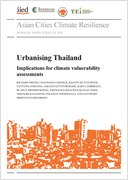Urbanising Thailand: implications for climate vulnerability assessments
 This report summarises a series of studies carried out by a multi-disciplinary team of Thai scholars. It focuses on the dynamics of urbanisation and climate change risks, and on the linkages between urbanisation, climate change and emerging patterns of urban poverty and vulnerability. It provides new and key insights, serving as a comprehensive background foundation for further research on urban climate vulnerability and resilience. Urbanisation processes as transformative processes are under-researched themes, not only in Thailand, but also in countries in Southeast Asia. Rapid physical and social transformations are taking place in these countries, yet the implications contributing to vulnerability are less well-understood. The research has focused on case studies from established and growing urban centres from across the country – Bangkok and the neighbouring area of Lad Krabang, Hat Yai, Chiang Mai, Udon Thani and Khon Kaen. Each case study presents its own specific insights into the history, drivers and implications of urbanisation, and also highlights many similarities. Drawing on a review of historical patterns of urbanisation and future risks associated with climate change, this research argues for a fundamental rethinking of future urbanisation in Thailand. This is a future that will need to be very different from current trajectories of
urbanisation, based on a policy process that will need to be founded on informed public dialogue.
This report summarises a series of studies carried out by a multi-disciplinary team of Thai scholars. It focuses on the dynamics of urbanisation and climate change risks, and on the linkages between urbanisation, climate change and emerging patterns of urban poverty and vulnerability. It provides new and key insights, serving as a comprehensive background foundation for further research on urban climate vulnerability and resilience. Urbanisation processes as transformative processes are under-researched themes, not only in Thailand, but also in countries in Southeast Asia. Rapid physical and social transformations are taking place in these countries, yet the implications contributing to vulnerability are less well-understood. The research has focused on case studies from established and growing urban centres from across the country – Bangkok and the neighbouring area of Lad Krabang, Hat Yai, Chiang Mai, Udon Thani and Khon Kaen. Each case study presents its own specific insights into the history, drivers and implications of urbanisation, and also highlights many similarities. Drawing on a review of historical patterns of urbanisation and future risks associated with climate change, this research argues for a fundamental rethinking of future urbanisation in Thailand. This is a future that will need to be very different from current trajectories of
urbanisation, based on a policy process that will need to be founded on informed public dialogue.
